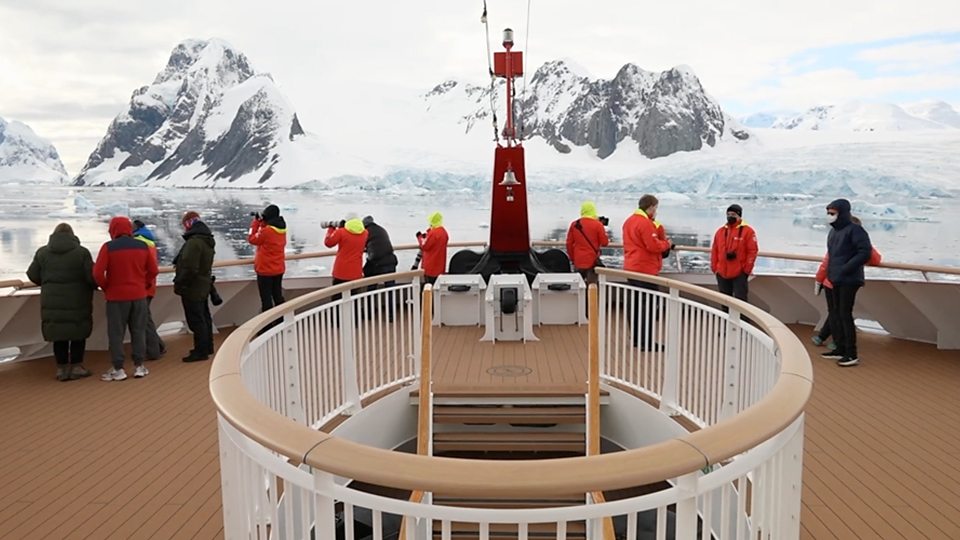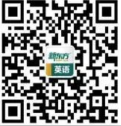本集内容
How tourism and science work together in Antarctica 南极洲旅游业与科学共荣
学习要点
有关 “adventure(冒险)” 的词汇
边看边答
How many visitors go to Antarctica each year?
文字稿
'Trip of a lifetime' is how many describe going to Antarctica. This incredibly alluring but remote location attracts around 60,000 visitors each year.
许多人将前往南极洲称为 “终生难得的旅行”。这个极具魅力而偏远的地方每年吸引约六万名游客。
These tourists are travelling on the Roald Amundsen, an expedition cruise ship that uses battery hybrid powered engines, has an impressive science centre, and equipment below deck that automatically analyses the surrounding seawater.
这些游客乘坐的是罗尔德·阿蒙森号,这是一艘考察游轮,使用柴油电池混合动力发动机,配有一个令人叹为观止的科学中心,甲板下方的设备可以自动分析周围的海水。
This scientist, visiting the ship for the first time, wonders if it's capable of doing even more.
这名科学家第一次造访这艘船,他想知道这艘船是否还有更多用处。
Alexander Koloskov, Senior Scientist, Vernadsky Research Base
This ship may be effectively used for real science, not only for education, not only to spread the information between the tourists, but the tourists can help with the science.
亚历山大·科洛斯科夫 沃纳德斯基研究站(Vernadsky Research Base)资深科学家
“这艘船可以有效地运用于真正的科学研究,而不仅是用于教育或向游客科普知识,当然游客也可以助科研一臂之力。”
Professor Alia Khan has a five-year research grant from the US National Science Foundation to study snow algae, and how it affects the rate that snow melts. But she can't spend five years straight in Antarctica, so joining a trip like this works well for her.
阿利雅·卡恩教授获得了美国国家科学基金会一项为期五年的科研基金,用于研究雪藻及其对雪融化速率的影响。但她无法整整五年一直待在南极洲,所以参加这种行程再合适不过了。
Alia Khan, Assistant Professor, Western Washington University
I'm able to collect some samples and data for my research, and I can use some of the facilities on the ship, such as the microscopes, to look at the samples and then also work with the tourists to show them what I'm sampling in the snow.
阿利雅·卡恩 美国西华盛顿大学助理教授
“我可以为我的研究收集样本和数据,并使用船上的显微镜等设备来查看样本,然后向游客展示我在雪地上采集的样本。”
Most of the ship's expedition crew also have science backgrounds, and help run citizen science projects for the passengers.
这艘船上的大部分探险队员也有科学背景,他们面向旅客开展公民科学项目活动。
Zoe Walker, Science Coordinator, Hurtigruten Expeditions
You have a little bubble of water on top and no air...
佐伊·沃克 Hurtigruten 探险公司科学协调员
“它的表面有水泡,但没有空气……”
Studying the microscopic phytoplankton in the water helps monitor the effects of global warming. Samples are packed up and sent off to be analysed by researchers who can't get here themselves.
研究水中微小的浮游植物可帮助监测全球变暖的影响。样本会被装好并寄给无法亲自到场的研究人员进行分析。
Zoe Walker, Science Coordinator, Hurtigruten Expeditions
Coming to places like Antarctica costs a lot and takes a lot of planning, so by integrating citizens into their science, they're able to collect data repeatedly at the same locations throughout the season while the tourist ships are already here.
佐伊·沃克 Hurtigruten 探险公司科学协调员
“到南极洲这样的地方成本很高,而且还要制定详尽的计划,所以通过将游客行程和科学考察结合在一起,科学家们得以在游船待在南极的整个期间在相同地点反复收集数据。”
Julie Ritson, BBC correspondent
Scientists also live and work in Antarctica for many months of the year. This presents its own unique challenges, logistics being one of them.
朱莉·瑞特森 BBC通讯员
“科学家们一年中会在南极生活和工作好几个月。许多难题也随之而来,物流就是难题之一。”
This research base on Livingston Island is temporary home to around 40 scientists, but their supply ship has been delayed and they're running low on food. Luckily, our ship was nearby and able to help.
这个位于利文斯顿岛的研究站是大约40名科学家的临时住所,给他们运送补给的船只受到延误,他们的食物就要用尽。幸好我们的船就在附近,能够给他们提供帮助。
For them it's been a lifesaver that tourist ships cruise these waters.
对他们来说,行驶在这片水域的游船可给他们帮了个大忙。
But what the scientific community really hope, is that the passengers return home as ambassadors, who can educate others and help change behaviours that threaten this fragile environment.
但科学界真正希望的是,乘客们以宣传大使的身份回家,向其他人普及相关知识,并帮助改变威胁南极这个脆弱环境的行为。
词汇
alluring 有魅力的,吸引人的
remote 偏远的
expedition 探险,考察
ambassadors 大使,宣传者
fragile 脆弱的
问题答案
Antarctica gets around 60,000 visitors each year.


 3342次下载
点击下载
3342次下载
点击下载
 2621次下载 点击下载
2621次下载 点击下载
 4734次下载 点击下载
4734次下载 点击下载
 1854次下载 点击下载
1854次下载 点击下载
 1391次下载 点击下载
1391次下载 点击下载
 1391次下载 点击下载
1391次下载 点击下载











